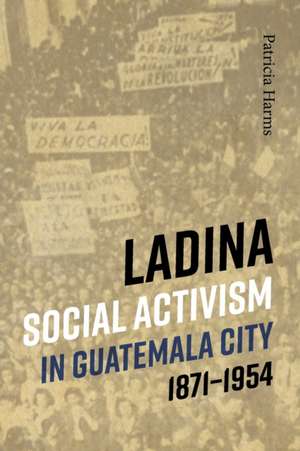Ladina Social Activism in Guatemala City, 1871-1954
Autor Patricia Harmsen Limba Engleză Paperback – 29 mai 2022
Winner of the CALACS Book Prize 2021 from the Canadian Association of Latin American and Caribbean Studies
Winner of the 2021 Judy Ewell Book Prize from the Rocky Mountain Council for Latin American Studies
In this groundbreaking new study on ladinas in Guatemala City, Patricia Harms contests the virtual erasure of women from the country's national memory and its historical consciousness. Harms focuses on Spanish-speaking women during the revolutionary decade and the liberalism periods, revealing a complex, significant, and palpable feminist movement that emerged in Guatemala during the 1870s and remained until 1954. During this era ladina social activists not only struggled to imagine a place for themselves within the political and social constructs of modern Guatemala, but they also wrestled with ways to critique and identify Guatemala's gendered structures within the context of repressive dictatorial political regimes and entrenched patriarchy. Harms's study of these women and their struggles fills a sizeable gap in the growing body of literature on women's suffrage, social movements, and political culture in modern Latin America. It is a valuable addition to students and scholars studying the rich history of the region.
| Toate formatele și edițiile | Preț | Express |
|---|---|---|
| Paperback (1) | 320.96 lei 6-8 săpt. | |
| University of New Mexico Press – 29 mai 2022 | 320.96 lei 6-8 săpt. | |
| Hardback (1) | 457.35 lei 6-8 săpt. | |
| University of New Mexico Press – mai 2020 | 457.35 lei 6-8 săpt. |
Preț: 320.96 lei
Nou
61.42€ • 64.29$ • 51.12£
Carte tipărită la comandă
Livrare economică 01-15 aprilie
Specificații
ISBN-10: 0826363873
Pagini: 422
Dimensiuni: 152 x 229 mm
Greutate: 0.62 kg
Editura: University of New Mexico Press
Notă biografică
Descriere
In this groundbreaking new study on ladinas in Guatemala City, Patricia Harms contests the virtual erasure of women from the country's national memory and its historical consciousness.
